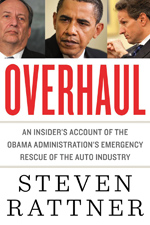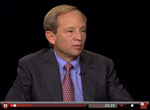Originally published in the Financial Times
During the past few weeks in the FT, the “Right Thinking” warriors of the Republican party have laid out their manifesto in broadly appealing principles rendered so gauzily as to nearly erase from history the hard-edged specifics that some of these same authors have sworn allegiance to.
But then the memories of GOP dogma kick in: vast, unaffordable tax cuts; evisceration of social welfare programmes; deep cuts in spending on practically everything else, from food stamps to national parks; steadfast opposition to gay marriage; intimations of harsh treatment of the US’s 11m illegal immigrants.
And on and on. The contrast between the high-minded commentary that appeared in these pages and pre-existing policy proposals could not be starker.
Proving that his silver tongue is matched by a silver pen, Congressman Paul Ryan issued a call to “restructure” entitlements so “important programmes can succeed well into the 21st century”.
In fact, what he has proposed in his draft budget is to transform Medicare from an entitlement programme in which seniors receive the care that they need into a voucher plan in which the elderly would receive a fixed allotment to buy their own insurance. If that amount proves insufficient or the insurance does not deliver adequate coverage, well, tough luck!
Medicaid, healthcare for the poor, would suffer a different, but equally disabling fate. It would be turned over to cash-starved states, the fiscal equivalent of being sent to the knacker for execution.
Meanwhile, Glenn Hubbard says the US needs to fix its riddled tax code and get its fiscal house in order. Well, of course it does; every sentient American knows that. But Mr Hubbard blithely ignores the plan put forth by Governor Mitt Romney, who he is advising: 20 per cent across the board tax cuts costing $2.8tn over the ensuing decade, to be paid for by closing loopholes that Mr Romney has refused to specify (apart from two minor items.) Even in a cynical age, that is cynicism of mind-boggling proportion.
The Romney/Hubbard tax plan would not result in net additional revenues, which means reducing the deficit would require spending reductions on a vast and – I believe – politically unacceptable and socially undesirable scale.
Finally, Mr Hubbard offers up the thoroughly discredited argument that deficit reduction can spur near-term economic growth. He should ask the British (or the eurozone members) how that austerity stuff is working out for them.
Amid all the disingenuousness lie a few hopeful wisps. Senator Olympia Snowe’s cri de coeur for the GOP to retreat from its extremism to the centre right is welcome – even coming on the eve of her retirement – as is the estimable Jon Huntsman’s call to embrace the progressivism of Theodore Roosevelt, a giant widely admired across party lines.
But that same Teddy Roosevelt was the first president to espouse national healthcare, while Mr Huntsman, a former Utah governor, advocated repeal of ObamaCare during the Republican primaries. Now he says full repeal of ObamaCare is “unlikely” and wants the “pointless sound bites” dropped.
Barack Obama mostly escaped a direct lashing. Instead, Republicans were sure to include code words to subtly identify the incumbent’s alleged failures: “defeatism”, “crony capitalism”, “ad hoc responses”, “bureaucrats” and the like.
In fact, Mr Obama is far closer to the right approach than his Republican nemeses. Putting in place a long-term deficit reduction plan is an urgent priority but it should be balanced between tax increases and spending cuts and phased in gradually, just as a speeding car should be decelerated slowly.
US spending on social welfare programmes can be curbed humanely, without gutting the social safety net. And of course policy certainty would benefit business and consumers alike. But let’s put the blame for the current drifting where it belongs: on Congress.
By all means go back and read the Right Thinking series, just also be sure to read the transcripts of the Republican presidential debates and the policy papers of Mr Ryan, Mr Romney and others who form the true core of the Republican party.


